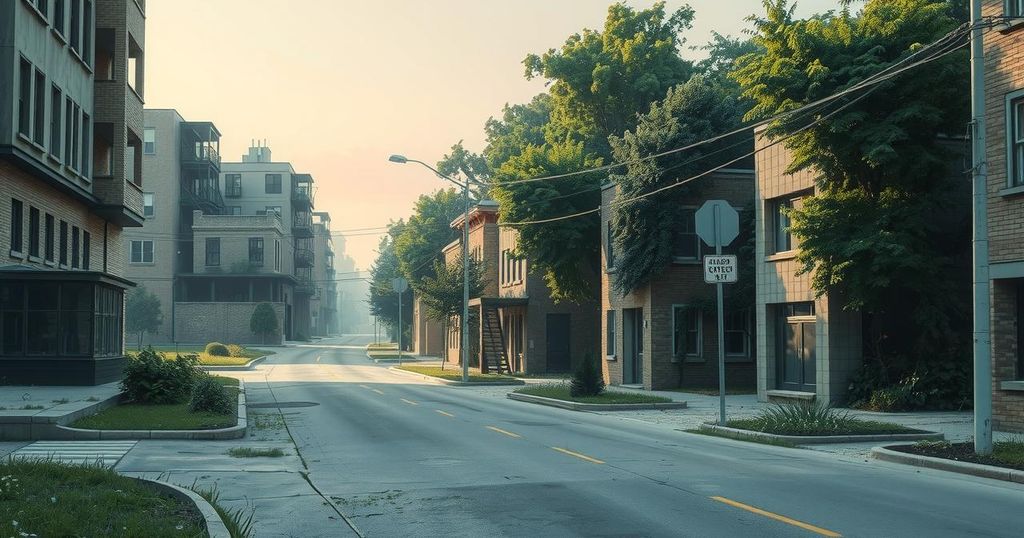Rwanda-Backed Rebels Cause Panic in Eastern Congo as Bukavu Residents Flee
Panic erupted in Bukavu, eastern Congo, as thousands fled amid advancing M23 rebels. Initial chaos involved looting and alarming discoveries of corpses. Despite the rebels not fully controlling the city, prior advances signaled rising tensions as large numbers of internally displaced people increased. Calls for a ceasefire have intensified amid fears of escalating violence that could ripple through the Great Lakes region.
On Saturday, panic engulfed Bukavu, the second-largest city in eastern Congo, as thousands of residents and soldiers sought to escape the advance of the Rwanda-backed M23 rebels. The morning after the fighters moved closer to the city, chaos unfolded with streets flooded by fleeing individuals and looters. A heavy silence fell over Bukavu as inhabitants prepared for the uncertain days ahead, following a day of mounting tension.
Although M23 rebels did not decisively control Bukavu as of Saturday, previous advances included capturing an airport outside the city. A local resident reported a brief cessation of gunfire as Congolese troops retreated southward. Inhabitants expressed dismay over the discovery of corpses in the streets, remnants of violent looting perpetrated in the absence of order.
Various reports have indicated instances of pillaging, with local factories ransacked and prisons emptied during the confusion. Civic unrest has prompted concerns for public safety, with some citizens falling victim to stray bullets. Lawrence Kanyuka, spokesperson for the Congo River Alliance that includes M23, urged residents to maintain control of their city.
Self-proclaimed governor Pierre Bahizi urged cooperation among residents to restore order, asserting that they must not cede authority to disorder on the streets. The M23 rebels, consisting of about 4,000 Rwandan troops, pose a significant challenge to the Congo central government. Control of Bukavu could invite renewed scrutiny from the international community amid ongoing global conflicts.
French President Emmanuel Macron has called for an immediate ceasefire and a withdrawal of M23 forces. The ongoing rebellion has produced nearly 3,000 casualties in the region and displaced over 350,000 individuals, according to U.N. and national authorities. The situation compounded with M23’s recent focus on Bukavu suggests a rapid escalation of hostilities.
Recent claims indicate that M23 has seized the airport in Bukavu, a crucial location for resupply missions. The Congolese government has condemned these actions as violations of ceasefire agreements, further complicating the security situation in the city. Similar patterns of military abandonment were observed leading up to M23’s previous capture of Goma, revealing structural challenges within Congo’s military.
The conflict has now emerged as a prominent topic at the African Union summit, with U.N. Secretary-General António Guterres emphasizing the risk of a wider regional conflict. He highlighted the need to respect Congo’s sovereignty and territorial integrity to prevent escalation. Despite a universal call for a ceasefire, the Great Lakes region remains fraught with tensions and competing militia interests.
Regional and international responses have varied, with ongoing military support from Burundi and the Southern African Development Community for Congo’s forces. Meanwhile, Ugandan troops are engaged against Islamist rebels in other regions, adding to the complexity of the regional security landscape. Authorities have issued stern warnings regarding any forces that oppose Ugandan Army control in sensitive areas.
The advancing M23 rebels have incited widespread panic and disorder in Bukavu, with significant implications for regional security and humanitarian conditions. The Congolese military continues to face challenges in maintaining stability and order amidst the escalating conflict. International attention is increasingly focused on the situation as calls for ceasefires and diplomatic resolutions continue to emerge. The potential for expanded violence poses serious risks to both local populations and broader regional stability.
Original Source: www.pbs.org




Post Comment